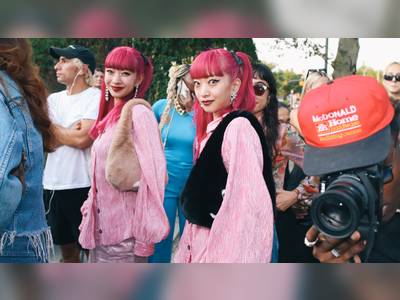Tashian switched to organic makeup, swapping out her lipstick, mascara and eyeliner for those made by the Dr. Hauschka Skin Care brand. She's still using an old compact of blush powder just because she hates to waste anything but plans to go all-organic once that runs out.
"I want to look better, and, at this age, you see skin go through dramatic changes," said Tashian, 61. At the same time, she'd rather use natural products to improve her complexion and says she likes the results so far.

![]()
Niche cosmetics made of organic material are becoming a popular trend among women who want to use fewer chemicals.
Tashian is part of a growing trend of women who are ditching compacts overloaded with chemicals and preservatives for those with natural and organic ingredients. Makers of natural cosmetics say their products contain plant, animal or mineral ingredients, not synthetics; organic makers say their ingredients are pesticide free.
These niche cosmetics are becoming increasingly popular as consumers look for products that are better for their skin and nicer to the planet.
Recently, the Campaign for Safe Cosmetics announced that it had found potentially dangerous levels of lead in lipsticks, saying one-third of the 33 red lipsticks it examined contained an amount that exceeds the FDA's limit for lead in candy. The FDA, however, does not set a limit for lead in lipstick.
But what, exactly, are "organic" cosmetics?
'Organic' is flexible term
Americans spent some $155 million on the top three mass-market natural personal care brands — Burt's Bees, Jason Natural Cosmetics and Tom's of Maine — during the 12 months through October, according to Information Resources Inc.
Sales of organic personal care items reached $350 million last year, an increase of $68 million over 2005, according to the Greenfield, Mass.-based Organic Trade Association. That's an increase of 24 percent, said Holly Givens, a spokeswoman for the industry group.
"Sales of all organic products are growing," Givens said. "A lot of people are moving beyond organic foods. They're realizing farmers can grow products that become ingredients in personal care items, as well."
But just because cosmetics companies label a tube of lipstick as natural or organic does not mean it makes for a better pucker or is kinder to the planet.
"Organic means nothing on a label. The word natural means nothing. You can't trust anything on a label, and companies will lie," said Ginger Garrett, an Atlanta author who researched scores of articles on the science of makeup in writing a book on the cosmetics used by ancient women.
Cosmetics and their ingredients are not required to undergo government approval before hitting the store shelves, according to the U.S. Food & Drug Administration. There are no standards as to what natural or organic means.
"If a company says it is organic because it uses organic flowers, they might be, but there could be a whole lot of different chemicals inside that product, as well," said Jovana Ruzicic, a spokeswoman for the Washington, D.C.-based, nonprofit Environmental Working Group.
The watchdog group is pushing for federal definitions of natural and organic when it comes to personal care products. "It's hard for us to recommend organic or natural when there is no definition for them," Ruzicic said.
The group runs a database of personal care items — from mascara to shampoo — to help consumers find safer alternatives at www.cosmeticsdatabase.com. The site lists ingredients, says whether they're linked to allergies or cancer, and suggests a better mascara or shampoo if the one you like is bad for you or the environment.
Know what's in there
Garrett said women should avoid three major ingredients in their cosmetics: preservatives called parabens; pthalates, which are often found in fragrances; and talc.
Parabens have been linked to breast cancer, but they are such cheap preservatives, companies rely on them, she said. One study showed pthalates to be harmful to the reproductive system. And talc has been linked to ovarian cancer, she said.

![]()
"We're all very concerned about the rise in breast cancer, autism and mysterious ailments," Garrett said. "We all want to find ways to protect our families and health. Women need to be savvy enough to know that big companies don't always tell us the truth."
Garrett prefers pure mineral makeup, which is free of synthetic colors, fragrances and preservatives.
If you are moving to a natural or organic cosmetics line, read the labels, she said. Some may have organic rose petals in them but also contain talc, which aside from being potentially harmful, isn't that great as a beauty ingredient. It's a cheap filler material that doesn't help the color in your makeup hold up well, Garrett said.
Tashian said she's made it a habit to read labels. She's switched to organic shampoo and conditioner. She doesn't use nail polish, which is often filled with pthalates. And, she prefers natural brands such as Burt's Bees and Kiss My Face for body lotion and face cleansers.
"I already buy organic vegetables," Tashian said. "So I thought I'd give organic makeup a try."
Photos By: BILLY KINGSLEY / THE TENNESSEAN













